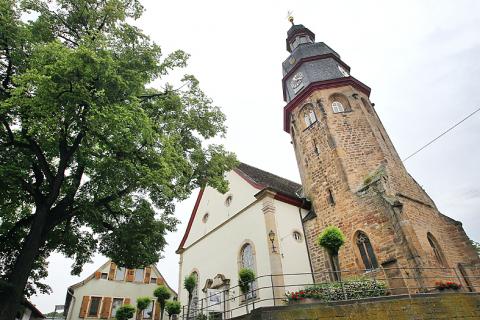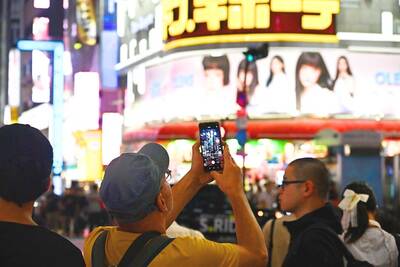Kallstadt, a tidy village in Germany’s lush wine country, has plenty of things to take pride in if you ask its friendly citizens — but Donald Trump is not one of them.
The presumptive US Republican presidential nominee’s grandparents grew up in the hamlet nestled in Germany’s southwest, but left for the US more than a century ago fleeing poverty and later, after a brief return, trouble with the law.
Today, no plaque hangs on the modest white houses where they grew up opposite each other on Freinsheimer Strasse, then called Engelsgasse (Angel’s Lane), and no street bears the Trump name.

Photo: AFP
However, in a year that could wind up with the brash billionaire becoming the leader of the free world, Trump is the talk of Kallstadt, population 1,200.
“The Trumps got rich off real estate; that is a major achievement, but none of them still live in town. Why should we be proud of that?” Mayor Thomas Jaworek, 48, asks. “If he becomes president, let’s see what he does for America and the world. Then maybe we’ll hang a plaque.”
The erstwhile Drumpf family simplified its name in about 1700 to Trump, long before Trump’s grandfather Friedrich set off for the US at the age of 16 in 1885, according to biographer Gwenda Blair.
Leaving only a farewell note on the kitchen table, he joined his sisters in New York, then went out west during the Gold Rush, opening taverns offering food, drink and female companionship to lonely fortune seekers, Blair said.
Friedrich, who anglicized his name to Frederick, shipped gold nuggets back east to his sisters, who used the proceeds to buy property, laying the foundations of the family empire.
Frederick returned to Kallstadt a wealthy man, married the neighbors’ daughter, Elisabeth Christ, and whisked her off to New York.
Her homesickness would soon bring them back to Kallstadt, but because Frederick had left Germany before completing his obligatory military service, he and his heavily pregnant wife were forced to return to the US in 1905, according to historian Roland Paul.
A quirk of history would have it that two of the US’ best-known self-made men came from the same small town, as the patriarch of the Heinz ketchup dynasty also hailed from Kallstadt.
Retired vintner Hans-Joachim Bender, 74, descends from a grandmother in the Trump clan and a grandfather who was a Heinz, but sees little family resemblance.
“What do I think of Trump’s policies? I’d better not say,” he said, sitting in his dining room as the sun set over the vines.
“Blowing hot air is not everyone’s thing. I think Hillary [Rodham Clinton] is a bit less ... radical,” he added, referring to the rival Democratic presumptive nominee.
The Trumps long claimed to be of Swedish stock due to anti-German sentiment in the US during the world wars and in the aftermath of the Holocaust.
However, filmmaker Simone Wendel, who made a light-hearted 2014 documentary about her hometown’s famous sons called Kings of Kallstadt, managed to cajole Trump to appear on camera at his Manhattan office in Trump Tower and discuss his German roots.
“The people in Kallstadt are very reliable, strong people and I feel that about myself — I’m strong and I’m very reliable. I’m on time, I get things done,” he says in the film.
Trump also promises to pay his first visit to Kallstadt the next time he is in Germany.
“I’m proud to have that German blood, there’s no question about it. Great stuff,” he said.
Kallstadt owes its reputation to crisp white wines, stunning hiking trails and the local delicacy of pig’s stomach (Saumagen).
Tourists, including many GIs on leave from the nearby US air base Ramstein, can choose from a range of quaint locales such as Pig Stomach Cellar, Pig Stomach Lounge and the Pig Stomach Paradise deli.
Working behind the meat counter, Edelgard Kellermann, 62, says the Trump phenomenon has attracted visitors from as far afield as Vietnam.
“It keeps things from getting boring around here,” she said with a smile.
However, her expression darkens when asked about Trump’s calls to build a wall on the Mexican border to stop illegal immigration and his attacks on German Chancellor Angela Merkel over her “insane” decision to open the doors last year to more than 1 million asylum seekers.
“Mr Trump is a descendant of a refugee — his forebears left here for economic reasons, to have a better life. He [Trump] has it even better and should give others the same chance,” she said, calling him a “demagogue.”
One month ago, tiny Kallstadt took in its first refugees, a Syrian family of four.
“It’s about showing humanity,” said Jaworek, who belongs to Merkel’s conservative Christian Democrats, bristling at Trump’s “harsh” rhetoric. “The fact that we now have a family who lived in refugee camps for a long time and who has now found a home in Kallstadt — that is a beautiful thing and we are happy about it.”
However, Kallstadt’s denizens, known in the regional dialect as Brulljesmacher or braggarts for their relative wealth and success, are mostly taking all the Trump hype on the chin.
During carnival season in February, the local newspaper ran a tongue-in-cheek article saying Trump would build a giant golden tower to dwarf the village’s church steeple, complete with a 55th-floor terrace to host an annual wine festival.

BRUSHED OFF: An ambassador to Australia previously said that Beijing does not see a reason to apologize for its naval exercises and military maneuvers in international areas China set off alarm bells in New Zealand when it dispatched powerful warships on unprecedented missions in the South Pacific without explanation, military documents showed. Beijing has spent years expanding its reach in the southern Pacific Ocean, courting island nations with new hospitals, freshly paved roads and generous offers of climate aid. However, these diplomatic efforts have increasingly been accompanied by more overt displays of military power. Three Chinese warships sailed the Tasman Sea between Australia and New Zealand in February, the first time such a task group had been sighted in those waters. “We have never seen vessels with this capability

A Japanese city would urge all smartphone users to limit screen time to two hours a day outside work or school under a proposed ordinance that includes no penalties. The limit — which would be recommended for all residents in Toyoake City — would not be binding and there would be no penalties incurred for higher usage, the draft ordinance showed. The proposal aims “to prevent excessive use of devices causing physical and mental health issues... including sleep problems,” Mayor Masafumi Koki said yesterday. The draft urges elementary-school students to avoid smartphones after 9pm, and junior-high students and older are advised not

Philippine President Ferdinand Marcos Jr has fired his national police chief, who gained attention for leading the separate arrests of former Philippine president Rodrigo Duterte on orders of the International Criminal Court and televangelist Apollo Carreon Quiboloy, who is on the FBI’s most-wanted list for alleged child sex trafficking. Philippine Executive Secretary Lucas Bersamin did not cite a reason for the removal of General Nicolas Torre as head of the 232,000-member national police force, a position he was appointed to by Marcos in May and which he would have held until 2027. He was replaced by another senior police general, Jose

POWER CONFLICT: The US president threatened to deploy National Guards in Baltimore. US media reports said he is also planning to station troops in Chicago US President Donald Trump on Sunday threatened to deploy National Guard troops to yet another Democratic stronghold, the Maryland city of Baltimore, as he seeks to expand his crackdown on crime and immigration. The Republican’s latest online rant about an “out of control, crime-ridden” city comes as Democratic state leaders — including Maryland Governor Wes Moore — line up to berate Trump on a high-profile political stage. Trump this month deployed the National Guard to the streets of Washington, in a widely criticized show of force the president said amounts to a federal takeover of US capital policing. The Guard began carrying